| Construction Rating: | starstarstarstar_borderstar_border |
| Flight Rating: | starstarstarstarstar_border |
| Overall Rating: | starstarstarstar_borderstar_border |
| Manufacturer: | Sky  |
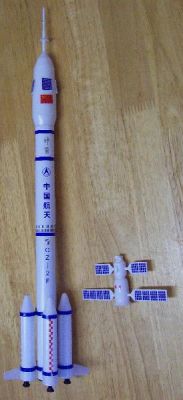
Brief:
The Sky Shenzhou is a single-stage scale model rocket with parachute recovery. This is a "hobby-scale" model of the CASC CZ-2F "Long March" rocket that has successfully carried Chinese Taikonauts to orbit in the Shenzhou orbital spacecraft on two missions. Apogee Components imported this kit from Shaanxi Zhongtian Rocket Technologies Co., Ltd (based in central China), translated and re-printed the instructions, designed and printed an English cover card insert, and offers the resulting kit at quite a low price.
Construction:
The Sky Shenzhou kit is packed with an impressive collection of parts. With this kit, the following items are included:
- 1 cover card insert
- 1 Instruction sheet, English only with diagrams, double-sided, 10-1/4" x 14"
- 1 Nose cone, molded white plastic, hollow, two-piece friction fit
- 1 Nose cone antenna, white plastic
- 4 Nose cones, white plastic, rounded conical, 15mm OD tenon
- 1 Body tube, convolutely wound, pre-printed, 22mm OD x 290mm long
- 4 Body tubes, convolutely wound, 16mm OD x 78mm long
- 1 Motor tube insert, black plastic
- 4 End plugs, white plastic, 15mm OD tenon
- 4 Fin units, milky-white translucent plastic
- 4 Decorative nozzle units, black plastic
- 2 Launch lugs with standoffs, molded plastic, 4.35mm I.D., 30.5mm long
- 1 Shenzhou capsule body, white plastic
- 1 Shenzhou capsule nose plug, white plastic
- 2 Shenzhou capsule short solar panels, white plastic
- 2 Shenzhou capsule long solar panels, white plastic
- 1 Motor clip, metal
- 1 Shock cord fabric elastic, 3mm wide x 39mm long
- 3 Shroud lines, cotton, 850mm each
- 6 Clear plastic adhesive-backed discs
- 1 Parasheet, hexagonal, 325mm across flats
- 1 Decal sheet, rub-on dry transfer
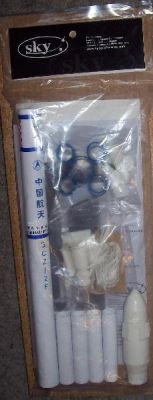

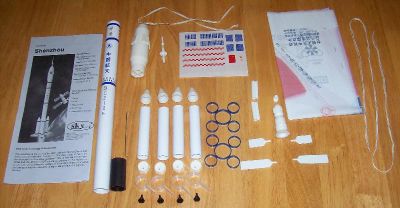
I really appreciate innovation and different ways of doing things. Several of the Shenzhou parts are quite unique. As with all of the Sky kits I've seen so far, no painting is required. The tubes are convolutely wound so there are no tube spirals. Instead, there is a single seam that runs along one side of the tube. The main body tube is intricately pre-printed. It's a beauty! The nose cone pieces are works of art, polished to a shine like a glazed ceramic and showing no seams. The two-piece nose opens up to reveal a small payload compartment big enough to hold the little Shenzhou capsule body. The only thing missing was a tri-fold shock cord mount. I decided to use a Kevlar/elastic shock cord mount arrangement so I added the following parts:
- 1 Kevlar cord, 15" long
- 1 Round elastic, 36" long
- 1 18mm Engine Block
The instructions are a quite sketchy where plenty of explanation is warranted.
The first step is "Assembly of the motor mount". This step glosses over a very interesting innovation. The Engine hook lies loose along a slot in the side of the plastic motor mount and the motor mount is glued with CA into the main body tube. This means that at launch time, about 1 inch of the motor is exposed below the main body tube. When the motor ignites, it initially slides 1 inch by itself before reaching end of travel and suddenly violently accelerating the rest of the model.

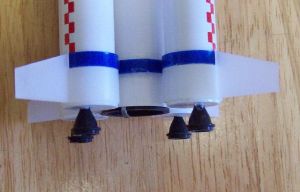
I looked at the rather short length of shock cord provided in the kit and decided that I wanted to use the Kevlar®/elastic shock cord mount instead. Before performing step 1, I wound a couple of layers of kraft paper around a thrust ring for a good fit in the body tube, tied the Kevlar®cord to it, and white-glued the thrust ring into the body tube near where I figured the motor would reach its end-of-travel at ignition time. I used white glue instead of yellow glue to avoid shrinkage that would pinch in the body tube.
Step 2 is "Strap on Booster Assembly". Here's where the instructions become very sketchy because there are a lot of details that are not mentioned or that are shown in an illustration but are not mentioned in the written instruction. Gluing the booster nose cones into the booster tubes is straightforward. The fit of the nose cones into the tubes was pretty tight, needing a bit of sanding of the nose cone tenon edges to allow easy insertion.
I feel that gluing the booster end caps into the booster tubes needs more discussion that what is given by the instructions. The nozzle mounting holes in the end caps are significantly off-center. When the tubes are mounted in the strap-on booster mount, their seams should be toward the main body tube so that they aren't noticeable. The end caps should be mounted so that the nozzle holes are aligned furthest away from the seam so that they line up with the booster fins when they are mounted.
Next, the decorative nozzles are mounted in the holes in the booster end caps. This is straightforward. Finally, the fin units are attached. I feel that the instructions leave out some important alignment details here as well. To keep the tube seems toward the main body, the fin unit needs to be aligned away from the booster tube's seam. If the booster end caps are aligned as mentioned above, then the spacing between the fin and the nozzle will be uniform. Otherwise, it'll be noticeably out-of-whack. Also, the fin units can be mounted flush with the booster tube or flush with the end cap, but the instructions provide no guidance here. I mounted mine flush with the tube, leaving the end caps sticking out a bit.

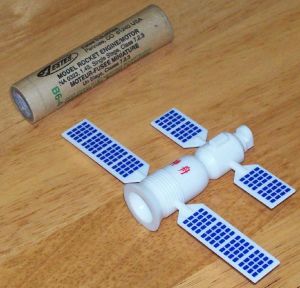
There is a step missing in the written instruction that is poorly documented in a diagram. Namely, gluing the booster tube assembly to the main body tube. The only dimension that is mentioned is the distance between booster mounts on the main body tube, but this dimension is needless because it is forced by the booster fin units and by the seam between the booster tubes and their nose cones. What is missing is the alignment of the whole booster tube assembly with the main body markings and the distance between the end of the main body and the bottom booster mount.
By searching out some pictures of the actual CZ-2F rocket on the Internet, I had found that the strap-on boosters are generally mounted with one booster lined up with the CZ-2F markings. For ease of assembly, I mounted the bottom booster mount 11mm from the rear of the main body tube. I found out later that the distance should have been greater to match the real CZ-2F, but they work okay the way I mounted them.
With plastic cement, I glued the bottom booster mount with the alignment I wanted and waited for the glue to dry. I did not glue the top mount until all pods were in place so that I could move the top mount to line up with the nose-tube seam of each booster tube as they were mounted. I then glued each booster assembly to both mounts, making sure that booster was inline with the main body tube and that the top booster mount lined up with the booster's nose-tube seam. Finally, I ran a bead of glue around the joint between the top booster mount and the body tube.
The instructions do not describe any of this and shows a diagram of the final assembly.
Most of the rest of the instructions give adequate detailed guidance and are easy to follow. I altered Step 5 "Nose cone and parachute assembly" for Kevlar/elastic shock cord assembly, tying the round elastic shock cord to the free end of the Kevlar cord and tying the free end of the shock cord to the nose cone.
The instructions give an interesting detailed description for folding the parachute that I haven't seen in other kits.
A step is missing in the instructions regarding gluing the Shenzhou capsule nose piece onto the Shenzhou capsule. The nose piece is a weird looking piece of plastic that isn't mentioned anywhere in the instruction but is shown on the card insert and the first page of the instructions. It was easy to orient and cement into place.
Overall, construction was interesting and gratifying, if not well-explained. The instructions left out a few steps and some alignment specifics. The resulting product looks stunning and feels sturdy. Parts fit together precisely and snugly although edges generally needed a bit of sanding to get things in place.
Finishing:
Finishing steps are missing from the instructions. No mention is made regarding use or placement of decals.
The decals are very, very cool. They are rub-on dry transfers that are highly detailed and incredibly thin. The placement of all decals except the Chinese flag are shown on the card insert. I had to do some Internet searching to find where the Chinese flag decal ought to go, just under one of the rectangular panels on the nose. Decal transfers were done by holding the decal sheet with the decal in position, then rubbing on the transfer backing with a round, hard object like a coin or the back tip of a small plastic-handled paint brush.
There's no painting required. The decals provide the finish. The end result is quite striking. If you are doing a classroom discussion about the Chinese space program, this would be a very impressive model to use as a visual aid.
Construction Rating: 3 out of 5
Flight:
First flight was during the first SAROS club launch of 2008 on May 4. The wind was variable, within 10 mph. I did not have one of the recommended motors on hand, but I figured the Shenzhou should be okay with a B4-4. I poured a load of cellulose insulation (dogbarf) into the body, then powdered and folded the chute, inserted the shock cord and chute and nose cone. I inserted the motor, the clip seemed to hold it securely. I inserted the igniter and igniter plug, then slipped the rocket onto a launch rod. I used an alligator clip to hold the rocket body far enough away from the launch pad so that the motor, which was extending an inch below the end of the body tube, was a few inches above the blast deflector. I hooked up the ignitor wires, went back to the launch controller, counted down, and pressed the launch button. The Shenzhou shot up perfectly straight without any noticeable spin. It reached apogee, arched over, started diving, and the ejection charge blew. A shorter delay, maybe 2 seconds instead of 4, would be better for this rocket.
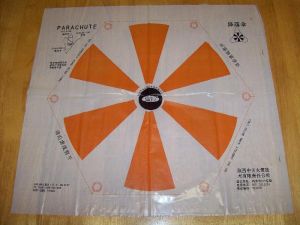
Recovery:
I built my Shenzhou with a Kevlar/elastic shock cord which worked well for the first flight. It was easy to install, too, by installing the Kevlar cord and thrust ring before the first step. I think this will prevent the dreaded chute separation problem that could lose the beautiful nose cone. The parachute deployed perfectly and the descent rate was about ideal. The Shenzhou landed gently without any noticeable damage. The model will fly again!
Flight Rating: 4 out of 5
Summary:
The Sky Shenzhou is an excellent buy for a very attractive scale model of the CZ-2F. It looks beautiful and flies great. There is enough work with the booster pods to earn the kit's skill level 3 rating, but it is a straightforward build otherwise.
The only negative things I've found with this kit are the short shock cord, lack of a tri-fold shock cord mount (very minor detail), and incomplete instructions.
Overall Rating: 3 out of 5
Other Reviews
- Sky Shenzhou By Chris Halinaty (September 19, 2008)
Image courtesy of Apogee Components Brief: The Sky Shenzou is labelled a skill level 3 kit but is more likely a 2. It comes pre-finished with a beautiful body tube and can be completed in about an hour. I thought the price was also good for a rocket that gets a lot of interest on the pad and comes with an ...
 |
 |
Flights
 |
 |